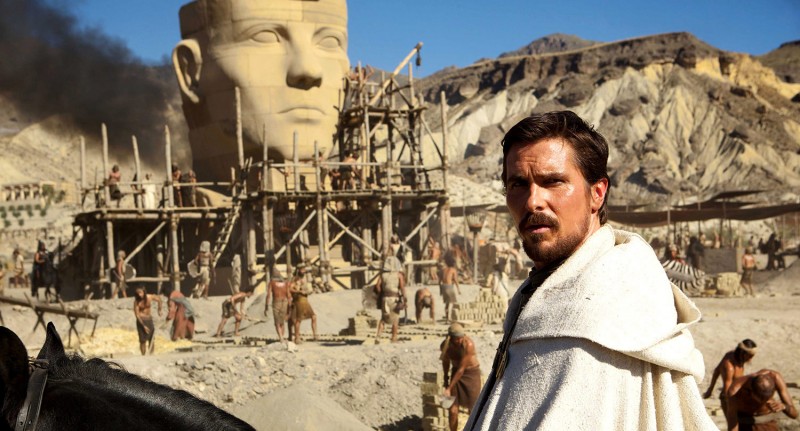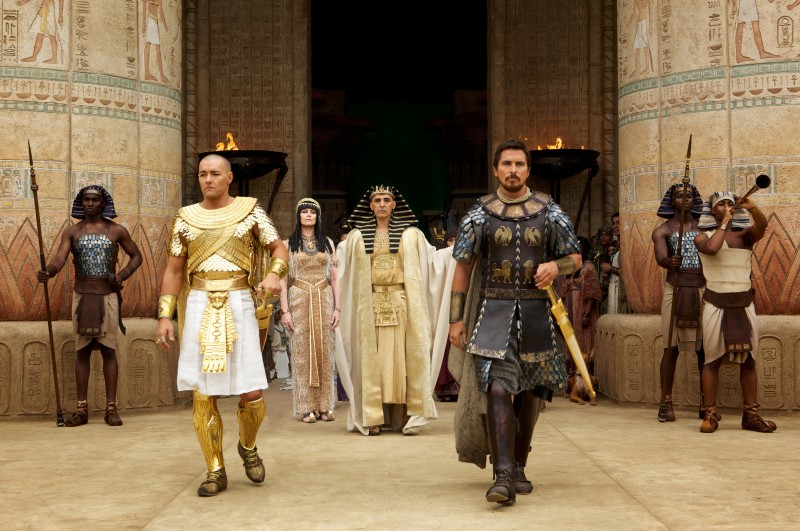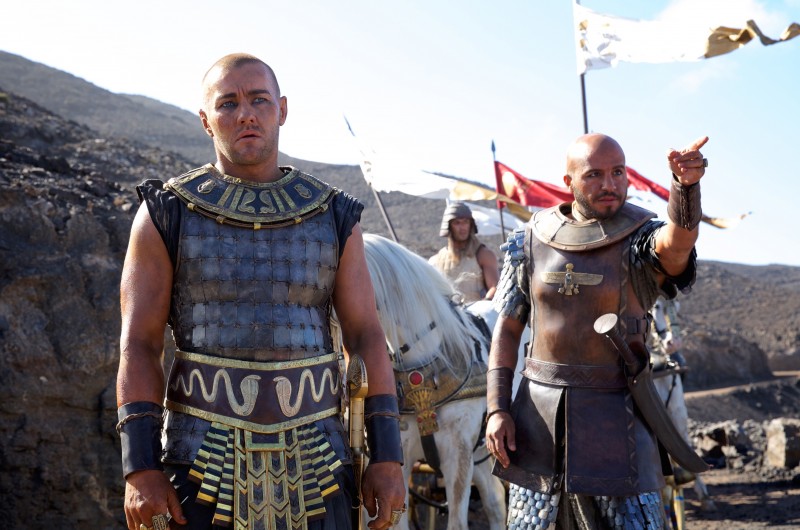Exodus: Gods and Kings Review
"Ridley Scott proves that he should stick to science fiction"
Ridley Scott's
Exodus: Gods and Kings presents a host of conflicting ideas on a grand scale achieved through CGI shortcuts and green screen. A patchwork of thematic and theistic elements overpower the exceedingly familiar biblical story; crushing Scott's narrative under its own weight.

The film opens with “brothers” Moses (Christian Bale) and Ramses (Joel Edgerton) receiving an ominous portent from their father's (John Turturro) sorceress, as they plan to ride into battle against the Hittite army. Serving only as a point of conflict between the men, this battle is short lived, and proves only that Ramses is a brash leader, and Moses is good with a sword. Scott opens his film very differently than the standard Hebrew/Sunday School story which has a Nile-cruising Moses being saved by Queen Bithia – and it remains his only significant deviation from the conventional legend. Scott continues the story with Moses being found out as a “Hebrew spy,” and an hour-long tangent wherein Moses' exile to the desert leads him to marry and have a son in Midian. It is during this 9-year period (as denoted by a handy intertitle) that Ramses begins an exploitation of the Jews so terrible that God cannot sit idly by any longer. Moses seems irritated that it took God 400 years to come to this conclusion. Appearing to Moses on a sacred Midianite mountain, God takes the form of a young boy and recruits Moses to his anti-Egyptian cause. Moses “abandons” his wife and son to return to Egypt to begin a campaign of sedition and terrorism to force Pharaoh Ramses to “let his people go” (this line is unfortunately never used).
Though Scott's film has many problems, production design is not one of them. Arthur Max has assembled some fantastic scenery in which Scott is able to beautifully capture the mood of the era. Lavish palaces inhabited by Ramses and Viceroy Hegep (Ben Mendelsohn), are fabulously decorated, and truly show the scale of Egyptian wealth. Working with a talented group of visual effects artists and graphic designers, Scott's film is truly grand in terms of scale. Massive battles, and sweeping overhead shots of Memphis show just how massive Egypt's reach was, and just how incredibly capable the civilization was.

As arresting and transportive as the visuals were, they served as a major point of contention when placed around a mostly white cast. From the moment Scott pans over the desert and settles in the immense meeting room of the Pharaoh's palace, the audience is transported to ancient Egypt only to be abruptly ripped back to contemporary modern society. Americanized white voices and faces fill every (important) role, and it is simply jarring to encounter. Politics, racism, and Hollywood funding aside,
Exodus is glaringly duplicitous in its striving for historically-accurate scenery, and complete disregard for who it places within the bounds of its carefully-constructed world. In the age of the politically-correct Internet, bloggers and journalists alike were quick to jump on Scott's whitewashing of the film. Satiating some, while fanning the burning outrage of others, Scott provided justification for his actions, to
Variety, “I can’t mount a film of this budget, where I have to rely on tax rebates in Spain, and say that my lead actor is Mohammad so-and-so from such-and-such, […] I’m just not going to get it financed. So the question doesn’t even come up.” While this is a hilarious answer reminiscent of a conversation one might have with their racist grandfather, Scott provides a seldom-discussed viewpoint into Hollywood financing – Arabs (non-whites in general) do not sell tickets. Scott, however, does not whitewash the whole cast, as he gives plenty “palace servant/slave” roles to blacks (there's even a brownish architect in one scene).

Ridley Scotts' inept casting choices only add to the tonal confusion of
Exodus as a whole. While Scott approaches the story of Exodus in relatively-unchanged manner, he does present Moses in a slightly new light. Extrapolating from his Egyptian childhood, Scott has Moses buck against both traditional Egyptian religion due to a single point mentioned by Ben Kingsley's Nun “you've felt something is wrong all of your life” and the religion he learns in bits-and-pieces via small interactions with slaves.
Scott and his writing staff (Adam Cooper, Bill Collage, Jeffrey Caine, and Steven Zaillian) approach Moses from a largely atheistic standpoint until his first interaction with God. Although the meeting took place after Moses was involved in a severe accident, involving long periods of unconsciousness, Moses is instantly convinced of God's reality, and his own need to help the Jews.
Exodus almost mocks Moses' choice to blindly follow a “hallucination” until, suddenly, Scott changes his tone and takes God's wrath very seriously, and portrays it as fact. As Moses continues down Yahweh's path, he grows concerned with the cruel and deadly force with which God punishes any and all non-Hebrews (although, 9/10 plagues sucked for everyone), yet is given no period in which to “evaluate it” as he is instantaneously transformed into the Biblical, God-exalting Moses.
Ridley Scott is known for his vast worlds that combine fantasy and science-fiction, taking his audiences on incredible journeys into the unknown. With
Exodus: God and Kings, Scott fails at providing both the journey, and a reason for his audience to follow. A heavily CGI-ed, racist, and emotionless mess,
Exodus's only fantasy derives from its all-white cast and the vengeful childish wrath of God.
Cons
- Poor everything else
- Bad Pacing
- Tonally inconsistent
- HISTORICAL WHITEWASHING!
 The film opens with “brothers” Moses (Christian Bale) and Ramses (Joel Edgerton) receiving an ominous portent from their father's (John Turturro) sorceress, as they plan to ride into battle against the Hittite army. Serving only as a point of conflict between the men, this battle is short lived, and proves only that Ramses is a brash leader, and Moses is good with a sword. Scott opens his film very differently than the standard Hebrew/Sunday School story which has a Nile-cruising Moses being saved by Queen Bithia – and it remains his only significant deviation from the conventional legend. Scott continues the story with Moses being found out as a “Hebrew spy,” and an hour-long tangent wherein Moses' exile to the desert leads him to marry and have a son in Midian. It is during this 9-year period (as denoted by a handy intertitle) that Ramses begins an exploitation of the Jews so terrible that God cannot sit idly by any longer. Moses seems irritated that it took God 400 years to come to this conclusion. Appearing to Moses on a sacred Midianite mountain, God takes the form of a young boy and recruits Moses to his anti-Egyptian cause. Moses “abandons” his wife and son to return to Egypt to begin a campaign of sedition and terrorism to force Pharaoh Ramses to “let his people go” (this line is unfortunately never used).
Though Scott's film has many problems, production design is not one of them. Arthur Max has assembled some fantastic scenery in which Scott is able to beautifully capture the mood of the era. Lavish palaces inhabited by Ramses and Viceroy Hegep (Ben Mendelsohn), are fabulously decorated, and truly show the scale of Egyptian wealth. Working with a talented group of visual effects artists and graphic designers, Scott's film is truly grand in terms of scale. Massive battles, and sweeping overhead shots of Memphis show just how massive Egypt's reach was, and just how incredibly capable the civilization was.
The film opens with “brothers” Moses (Christian Bale) and Ramses (Joel Edgerton) receiving an ominous portent from their father's (John Turturro) sorceress, as they plan to ride into battle against the Hittite army. Serving only as a point of conflict between the men, this battle is short lived, and proves only that Ramses is a brash leader, and Moses is good with a sword. Scott opens his film very differently than the standard Hebrew/Sunday School story which has a Nile-cruising Moses being saved by Queen Bithia – and it remains his only significant deviation from the conventional legend. Scott continues the story with Moses being found out as a “Hebrew spy,” and an hour-long tangent wherein Moses' exile to the desert leads him to marry and have a son in Midian. It is during this 9-year period (as denoted by a handy intertitle) that Ramses begins an exploitation of the Jews so terrible that God cannot sit idly by any longer. Moses seems irritated that it took God 400 years to come to this conclusion. Appearing to Moses on a sacred Midianite mountain, God takes the form of a young boy and recruits Moses to his anti-Egyptian cause. Moses “abandons” his wife and son to return to Egypt to begin a campaign of sedition and terrorism to force Pharaoh Ramses to “let his people go” (this line is unfortunately never used).
Though Scott's film has many problems, production design is not one of them. Arthur Max has assembled some fantastic scenery in which Scott is able to beautifully capture the mood of the era. Lavish palaces inhabited by Ramses and Viceroy Hegep (Ben Mendelsohn), are fabulously decorated, and truly show the scale of Egyptian wealth. Working with a talented group of visual effects artists and graphic designers, Scott's film is truly grand in terms of scale. Massive battles, and sweeping overhead shots of Memphis show just how massive Egypt's reach was, and just how incredibly capable the civilization was.
 As arresting and transportive as the visuals were, they served as a major point of contention when placed around a mostly white cast. From the moment Scott pans over the desert and settles in the immense meeting room of the Pharaoh's palace, the audience is transported to ancient Egypt only to be abruptly ripped back to contemporary modern society. Americanized white voices and faces fill every (important) role, and it is simply jarring to encounter. Politics, racism, and Hollywood funding aside, Exodus is glaringly duplicitous in its striving for historically-accurate scenery, and complete disregard for who it places within the bounds of its carefully-constructed world. In the age of the politically-correct Internet, bloggers and journalists alike were quick to jump on Scott's whitewashing of the film. Satiating some, while fanning the burning outrage of others, Scott provided justification for his actions, to Variety, “I can’t mount a film of this budget, where I have to rely on tax rebates in Spain, and say that my lead actor is Mohammad so-and-so from such-and-such, […] I’m just not going to get it financed. So the question doesn’t even come up.” While this is a hilarious answer reminiscent of a conversation one might have with their racist grandfather, Scott provides a seldom-discussed viewpoint into Hollywood financing – Arabs (non-whites in general) do not sell tickets. Scott, however, does not whitewash the whole cast, as he gives plenty “palace servant/slave” roles to blacks (there's even a brownish architect in one scene).
As arresting and transportive as the visuals were, they served as a major point of contention when placed around a mostly white cast. From the moment Scott pans over the desert and settles in the immense meeting room of the Pharaoh's palace, the audience is transported to ancient Egypt only to be abruptly ripped back to contemporary modern society. Americanized white voices and faces fill every (important) role, and it is simply jarring to encounter. Politics, racism, and Hollywood funding aside, Exodus is glaringly duplicitous in its striving for historically-accurate scenery, and complete disregard for who it places within the bounds of its carefully-constructed world. In the age of the politically-correct Internet, bloggers and journalists alike were quick to jump on Scott's whitewashing of the film. Satiating some, while fanning the burning outrage of others, Scott provided justification for his actions, to Variety, “I can’t mount a film of this budget, where I have to rely on tax rebates in Spain, and say that my lead actor is Mohammad so-and-so from such-and-such, […] I’m just not going to get it financed. So the question doesn’t even come up.” While this is a hilarious answer reminiscent of a conversation one might have with their racist grandfather, Scott provides a seldom-discussed viewpoint into Hollywood financing – Arabs (non-whites in general) do not sell tickets. Scott, however, does not whitewash the whole cast, as he gives plenty “palace servant/slave” roles to blacks (there's even a brownish architect in one scene).
 Ridley Scotts' inept casting choices only add to the tonal confusion of Exodus as a whole. While Scott approaches the story of Exodus in relatively-unchanged manner, he does present Moses in a slightly new light. Extrapolating from his Egyptian childhood, Scott has Moses buck against both traditional Egyptian religion due to a single point mentioned by Ben Kingsley's Nun “you've felt something is wrong all of your life” and the religion he learns in bits-and-pieces via small interactions with slaves.
Scott and his writing staff (Adam Cooper, Bill Collage, Jeffrey Caine, and Steven Zaillian) approach Moses from a largely atheistic standpoint until his first interaction with God. Although the meeting took place after Moses was involved in a severe accident, involving long periods of unconsciousness, Moses is instantly convinced of God's reality, and his own need to help the Jews. Exodus almost mocks Moses' choice to blindly follow a “hallucination” until, suddenly, Scott changes his tone and takes God's wrath very seriously, and portrays it as fact. As Moses continues down Yahweh's path, he grows concerned with the cruel and deadly force with which God punishes any and all non-Hebrews (although, 9/10 plagues sucked for everyone), yet is given no period in which to “evaluate it” as he is instantaneously transformed into the Biblical, God-exalting Moses.
Ridley Scott is known for his vast worlds that combine fantasy and science-fiction, taking his audiences on incredible journeys into the unknown. With Exodus: God and Kings, Scott fails at providing both the journey, and a reason for his audience to follow. A heavily CGI-ed, racist, and emotionless mess, Exodus's only fantasy derives from its all-white cast and the vengeful childish wrath of God.
Ridley Scotts' inept casting choices only add to the tonal confusion of Exodus as a whole. While Scott approaches the story of Exodus in relatively-unchanged manner, he does present Moses in a slightly new light. Extrapolating from his Egyptian childhood, Scott has Moses buck against both traditional Egyptian religion due to a single point mentioned by Ben Kingsley's Nun “you've felt something is wrong all of your life” and the religion he learns in bits-and-pieces via small interactions with slaves.
Scott and his writing staff (Adam Cooper, Bill Collage, Jeffrey Caine, and Steven Zaillian) approach Moses from a largely atheistic standpoint until his first interaction with God. Although the meeting took place after Moses was involved in a severe accident, involving long periods of unconsciousness, Moses is instantly convinced of God's reality, and his own need to help the Jews. Exodus almost mocks Moses' choice to blindly follow a “hallucination” until, suddenly, Scott changes his tone and takes God's wrath very seriously, and portrays it as fact. As Moses continues down Yahweh's path, he grows concerned with the cruel and deadly force with which God punishes any and all non-Hebrews (although, 9/10 plagues sucked for everyone), yet is given no period in which to “evaluate it” as he is instantaneously transformed into the Biblical, God-exalting Moses.
Ridley Scott is known for his vast worlds that combine fantasy and science-fiction, taking his audiences on incredible journeys into the unknown. With Exodus: God and Kings, Scott fails at providing both the journey, and a reason for his audience to follow. A heavily CGI-ed, racist, and emotionless mess, Exodus's only fantasy derives from its all-white cast and the vengeful childish wrath of God.